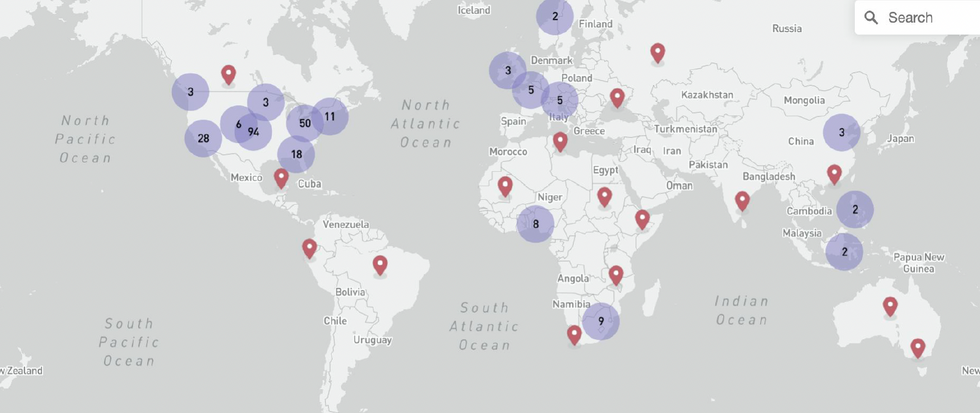In an exclusive investigation into online disinformation surrounding the reaction to Donald Trump’s hush-money trial, GZERO asks whether bots are being employed to shape debates about the former president’s guilt or innocence. We investigated, with the help of Cyabra, a firm that specializes in tracking bots, to look for disinformation surrounding the online reactions to Trump’s trial. Is Trump’s trial the target of a massive online propaganda campaign – and, if so, which side is to blame?
_____________
Adult film actress Stormy Daniels testified on Tuesday against former President Donald Trump, detailing her sexual encounter with Trump in 2006 and her $130,000 hush money payment from Trump's ex-attorney Michael Cohen before the 2016 election. In the process, she shared explicit details and said she had not wanted to have sex with Trump. This led the defense team to call for a mistrial. Their claim? That the embarrassing aspects were “extraordinarily prejudicial.”
Judge Juan Merchan denied the motion – but also agreed that some of the details from Daniels were “better left unsaid.”
The trouble is, plenty is being said, inside the courtroom and in the court of public opinion – aka social media. With so many people learning about the most important trials of the century online, GZERO partnered with Cyabra to investigate how bots are influencing the dialogue surrounding the Trump trials. For a man once accused of winning the White House off the steam of Russian meddling, the results may surprise you.
Bots – surprise, surprise – are indeed rampant amid the posts about Trump’s trials online. Cyabra’s AI algorithm analyzed 7,500 posts with hashtags and phrases related to the trials and found that 17% of Trump-related tweets came from fake accounts. The team estimated that these inauthentic tweets reached a whopping 49.1 million people across social media platforms.
Ever gotten into an argument on X? Your opponent might not have been real. Cyabra found that the bots frequently comment and interact with real accounts.
The bots also frequently comment on tweets from Trump's allies in large numbers, leading X’s algorithm to amplify those tweets. Cyabra's analysis revealed that, on average, bots are behind 15% of online conversations about Trump. However, in certain instances, particularly concerning specific posts, bot activity surged to over 32%.
But what narrative do they want to spread? Well, it depends on who’s behind the bot. If you lean left, you might assume most of the bots were orchestrated by MAGA hat owners – if you lean right, you’ll be happy to learn that’s not the case.
Rather than a bot army fighting in defense of Trump, Cyabra found that 73% of the posts were negative about the former president, offering quotes like “I don’t think Trump knows how to tell the truth” and “not true to his wife, not true to the church, not true to the country, just a despicable traitor.”
Meanwhile, only 4% were positive. On the positive posts, Cyabra saw a pattern of bots framing the legal proceedings as biased and painting Trump as a political martyr. The tweets often came in the form of comments on Trump’s allies’ posts in support of the former president. For example, in a tweet from Marjorie Taylor Greene calling the trials “outrageous” and “election interference,” 32% of the comments were made by inauthentic profiles.
Many of the tweets and profiles analyzed were also indistinguishable from posts made by real people – a problem many experts fear is only going to worsen. As machine learning and artificial intelligence advance, so too will the fake accounts and attempts to shape political narratives.
Moreover, while most of the bots came from the United States – it was by no means all of them. The location of some of the bots does not exactly read like a list of usual suspects, with only three in China and zero in Russia (see map below).
 Cyabra
Cyabra
This is just one set of data based on one trial, so there are limitations to drawing broader conclusions. But we do know, of course, that conservatives have long been accused of jumping on the bot-propaganda train to boost their political fortunes. In fact, Cyabra noted last year that pro-Trump bots were even trying to sow division amongst Republicans and hurt Trump opponents like Nikki Haley.
Still, Cyabra’s research, both then and now, shows that supporters of both the left and the right are involved in the bot game – and that, in this case, much of the bot-generated content was negative about Trump, which contradicts assumptions that his supporters largely operate bots. It’s also a stark reminder to ensure you’re dealing with humans in your next online debate.
In the meantime, check out Cyabra’s findings in full by clicking the button below.



















